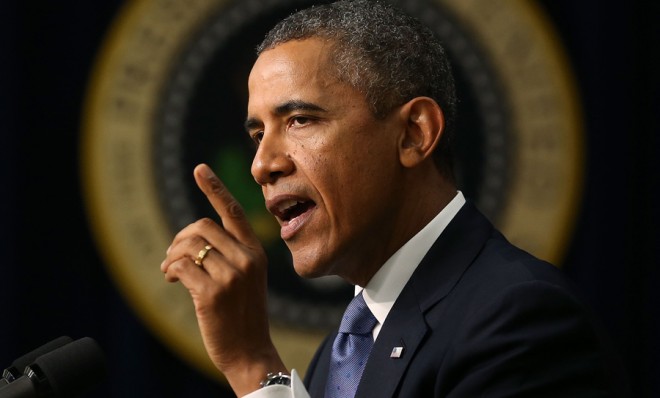How the U.N.'s Syria report strengthens Obama's hand
"This is a war crime," says U.N. Secretary General Ban Ki Moon.


A free daily email with the biggest news stories of the day – and the best features from TheWeek.com
You are now subscribed
Your newsletter sign-up was successful
United Nations inspectors confirmed Monday that hundreds of Syrians who died in an Aug. 21 attack outside Damascus were killed with sarin nerve gas.
The highly anticipated U.N. report marks the first official conclusion by independent scientists that the victims had been gassed. "The findings are beyond doubt and beyond the pale," Secretary-General Ban Ki Moon said. "This is a war crime."
Neither Ban nor the U.N. inspectors would say who committed the atrocity — Syrian President Bashar al-Assad and the rebels fighting to topple him have accused each other.
The Week
Escape your echo chamber. Get the facts behind the news, plus analysis from multiple perspectives.

Sign up for The Week's Free Newsletters
From our morning news briefing to a weekly Good News Newsletter, get the best of The Week delivered directly to your inbox.
From our morning news briefing to a weekly Good News Newsletter, get the best of The Week delivered directly to your inbox.
The Obama administration and its allies, however, jumped on the findings, saying that only Assad forces had the capacity to carry out such a massive attack with chemical weapons — bolstering their push for a strong U.N. resolution to quickly seize and destroy Syria's stockpile of deadly gases.
"The regime possesses sarin, and we have no evidence that the opposition possesses sarin," Samantha Power, the U.S. ambassador to the U.N., told CNN.
The U.N. inspectors, who visited the scene of the attack, also found rocket fragments indicating that the nerve gas had been delivered with two types of artillery-launched rocket — the M14 and the 330mm. Assad's military has these big guns; the rebels don't.
Furthermore, arms experts doubt that opposition fighters have the expertise to use these rocket launchers effectively, even if they have captured some from Assad's army. "It's hard to say with certainty that the rebels don't have access to these delivery systems," Dina Esfandiary, a chemical weapons expert, tells Britain's Telegraph. "But even if they do, using them in such a way as to ensure that the attack was successful is the bit the rebels won't know how to do."
A free daily email with the biggest news stories of the day – and the best features from TheWeek.com
The timing of the U.N.'s assessment works in President Obama's favor. The U.S. has just reached an agreement with Russia for the international community to take control of Assad's stockpile — estimated at 1,000 tons of sarin, mustard gas, and other poisons — by the middle of next year. Secretary of State John Kerry is demanding a U.N. resolution that will leave open the option of using force if Assad doesn't fulfill his promise to hand over his chemical arsenal, and the U.N. report will make it easier to rally other nations behind a get-tough approach.
If the Security Council fails to reach a deal, and Assad doesn't hand over his chemical weapons, the issue could be thrust back into the hands of Congress, which was debating whether to authorize Obama to order missile strikes against Syria when the unexpected diplomatic push put military action on hold. The U.N. report gives Obama outside evidence to present to reluctant lawmakers to back up his accusations against Assad.
Harold Maass is a contributing editor at The Week. He has been writing for The Week since the 2001 debut of the U.S. print edition and served as editor of TheWeek.com when it launched in 2008. Harold started his career as a newspaper reporter in South Florida and Haiti. He has previously worked for a variety of news outlets, including The Miami Herald, ABC News and Fox News, and for several years wrote a daily roundup of financial news for The Week and Yahoo Finance.
